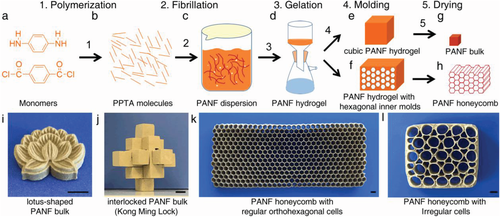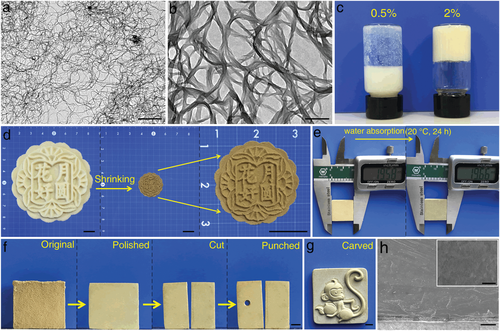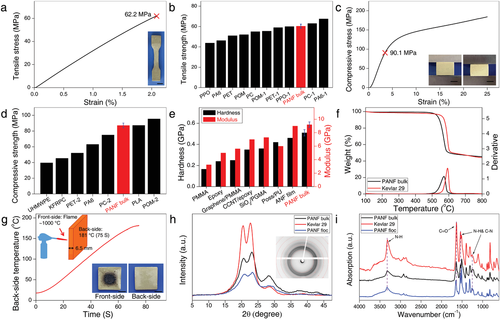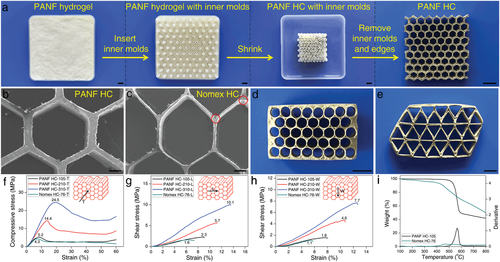AM Tsinghua Xinlin / North Hua Qiu Teng: polymerization induced polyaramid nanofiber hydrogel to build aramid engineering materials
[Abstract]
The processing of PPTA has been a great challenge for a long time. Recently, Tuo Xinlin, associate researcher of Tsinghua University / Professor Qiu Teng of Beijing University of chemical technology, reported a simple "monomer nanofiber macro product" (MNM) layered self-assembly method to construct 3D full PPTA engineering materials. This method mainly includes the preparation of aramid nanofibers (PANFs) from the monomer polymerization and the preparation of all PPTA materials from PANF hydrogels. After the PANF hydrogel is dehydrated and shrinks, various 3D structures can be obtained, including simple solid blocks and complex honeycombs (HC). The tensile strength and compressive yield strength of PANF are over 62 MPa and 90 MPa respectively, which are comparable to those of typical engineering plastics. The compressive strength of PANF HC with density of 360 kgm-3 is more than 24 MPa.
The thermal stability of PANF block and PANF HC is as good as Kevlar fiber ° There is almost no decomposition before C. In addition, MNM process is carried out under mild conditions without high temperature, high pressure or corrosive solvents. MNM process is a new strategy for processing all aromatic polyamide materials with complex structure and high performance, which will be another development after the breakthrough of PPTA liquid crystal spinning technology. The related papers were published in advanced materials under the title of construction of aramid engineering materials via polymerization induced para aramid nanofiber hydrogel.
[main picture guide]

Schematic diagram 1 Schematic diagram of manufacturing process of all PPTA materials and typical products (MNM method). a) The polymerization of PPTA. b) PPTA molecule. c) PANF prepared in the dispersion. D) filtration of PANF hydrogels obtained from PANF dispersions. E) cubic PANF hydrogel. F) PANF hydrogel with hexagonal nylon column as internal model. G) (E) the PANF body after hydrogel drying. H) in the (f) hydrogel dried, PANF HC with regular hexagonal cells. i) Lotus shaped PANF in bulk. j) The interlocking "Kongming lock" is assembled from processed PANF bulk materials. k) PANF HC with regular hexagonal cells. l) PANF HC with irregular cells( i) The scale in – (L) is 5 mm.

Fig. 2 characteristics of PANF, PANF hydrogel and PANF block. a. B) transmission electron microscopy (TEM) images of PANF at different magnification; Scale: (a) and (b) are 2 μ M and 200 nm. C) the macroscopic state of PANF dispersions /PANF hydrogels with different PANF concentrations. D) the PANF hydrogel of the original moon cake and the densified PANF block obtained by drying and shrinking the hydrogel. Scale: 10 mm. The moon cake says "full moon with flowers". e) Water absorption (20 ° C. After 24 hours, the size of PANF body changed. f) Typical post-processing methods of PANF block (polishing, cutting and stamping); Scale: 4 mm. g) Carving PANF (hanging decoration); Scale: 4 mm. h) Scanning electron microscopy (SEM) images of PANF block at different magnification were obtained; Scale: (H) and illustration are 5 μ M and 100 nm.

Fig. 3 properties and structure analysis of PANF block with density of 1.40 GCM − 3. a) The typical tensile stress strength curve of PANF block. The illustration is a dumbbell shaped bulk sample of PANF; Scale: 5 mm. b) Comparison of tensile strength between PANF block and five kinds of engineering plastics. c) Typical compressive stress-strain curves of PANF block. The illustration is the PANF block before and after compression; Scale: 2 mm. d) The compressive strength of PANF is compared with that of other plastics or polymer matrix composites. e) The comparison of hardness and elastic modulus between PANF and other plastics or polymer matrix composites is characterized by nanoindentation( b) The error bars in (d) and (E) are obtained by averaging different test samples. f) TGA and DTA curves of PANF block and Kevlar 29. g) Under the flame (about 1000) ° C) Back temperature of PANF block plate (thickness = 6.5 mm). The illustration shows the front and back sides of the tested PANF bulk board; Scale: 20 mm. h) The XRD patterns of PANF block, Kevlar 29 and PANF flocs were analyzed. The illustration shows the diffraction image of PANF block. i) The FTIR spectra of PANF, Kevlar 29 and PANF flocs were analyzed.

Fig. 4 preparation process, structure and properties of PANF honeycomb. a) Typical preparation procedure of PANF HCS; Scale: 10 mm. b. C) typical SEM images of the microstructure of PANF HC and Nomex HC nodes, respectively( c) The red circle in represents the structural defect of Nomex HC; Scale: 1 mm. d. E) PANF HC with square and triangular elements respectively; Scale: 10 mm. f) The compressive stress-strain curves of PANF and Nomex HCS in the T direction. g. H) the shear stress-strain curves of PANF and Nomex HCS in L and W directions, respectively. i) TGA and DTA curves of PANF hc-105 and Nomex hc-76.
summary
A variety of all PPTA 3D materials, including PANF blocks with different morphologies and PANF HCS with different structures, can be successfully prepared by an innovative bottom-up MNM method, which does not involve high temperature, high pressure or highly toxic solvents. The mechanical strength of PANF body is comparable to that of traditional engineering plastics, and the mechanical strength of PANF HC is also excellent. Composed of pure PPTA, PANF and PANF HC showed excellent thermal stability. In addition, the binder free and high density properties are significant improvements in the preparation of aramid HCS. The successful preparation of high performance PANF block or PANF HCS has the potential to be used as engineering materials, which is a breakthrough in the wider application of aramid processing. This simple and scalable MNM method can construct macro materials with complex structure and high performance in a mild way, which is a successful combination of nanotechnology and layered self-assembly.
This information is from the Internet for academic exchange only. If there is any infringement, please contact us to delete it immediately
+86-18915694570(WhatsApp&WeChat)
Previous: The simple manufacture


